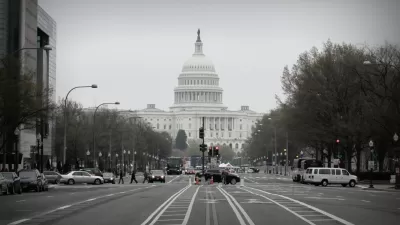A New York city councilmember, trained in urban planning, presents ideas for protecting tenants and small businesses in the ongoing economic downturn.

Brad Lander, member of the New York City Council representing parts of Brooklyn with a master's in urban planning, writes in The New York Times about the need to empower public and social interest in the real estate market in the wake of the coronavirus depression—preventing a 'feeding frenzy' by private developers.
So as the havoc of Covid-19 stirs the same dire warnings of New York’s demise as were heard during the 1970s fiscal crisis, history provides lessons in how not to respond. Fortunately it also provides a lesson for how we can rebound, using social ownership of land to help create a just, vibrant and durable recovery.
Citing the examples of Penn South in Chelsea and the Brooklyn Navy Yard, Lander also proposes legislation that outpace anything in D.C. or Albany that would support tenants and small businesses through the economic difficulties of the pandemic.
Instead of letting distressed properties be auctioned off when owners default on mortgages and taxes, the city should step in. We could acquire and hold these properties temporarily through a city-controlled land bank, based on legislation I’ve introduced, and then transfer them to a growing network of community land trusts, nonprofit entities that hold land in perpetuity for publicly beneficial uses.
The time to protect the interests of the public from the power of big money, according to Lander, is now—even if some of the long-term effects of the economic downturn aren't yet apparent.
FULL STORY: How to Avoid a Post-Recession Feeding Frenzy by Private Developers

Planetizen Federal Action Tracker
A weekly monitor of how Trump’s orders and actions are impacting planners and planning in America.

San Francisco's School District Spent $105M To Build Affordable Housing for Teachers — And That's Just the Beginning
SFUSD joins a growing list of school districts using their land holdings to address housing affordability challenges faced by their own employees.

The Tiny, Adorable $7,000 Car Turning Japan Onto EVs
The single seat Mibot charges from a regular plug as quickly as an iPad, and is about half the price of an average EV.

Seattle's Plan for Adopting Driverless Cars
Equity, safety, accessibility and affordability are front of mind as the city prepares for robotaxis and other autonomous vehicles.

As Trump Phases Out FEMA, Is It Time to Flee the Floodplains?
With less federal funding available for disaster relief efforts, the need to relocate at-risk communities is more urgent than ever.

With Protected Lanes, 460% More People Commute by Bike
For those needing more ammo, more data proving what we already knew is here.
Urban Design for Planners 1: Software Tools
This six-course series explores essential urban design concepts using open source software and equips planners with the tools they need to participate fully in the urban design process.
Planning for Universal Design
Learn the tools for implementing Universal Design in planning regulations.
Smith Gee Studio
City of Charlotte
City of Camden Redevelopment Agency
City of Astoria
Transportation Research & Education Center (TREC) at Portland State University
US High Speed Rail Association
City of Camden Redevelopment Agency
Municipality of Princeton (NJ)





























